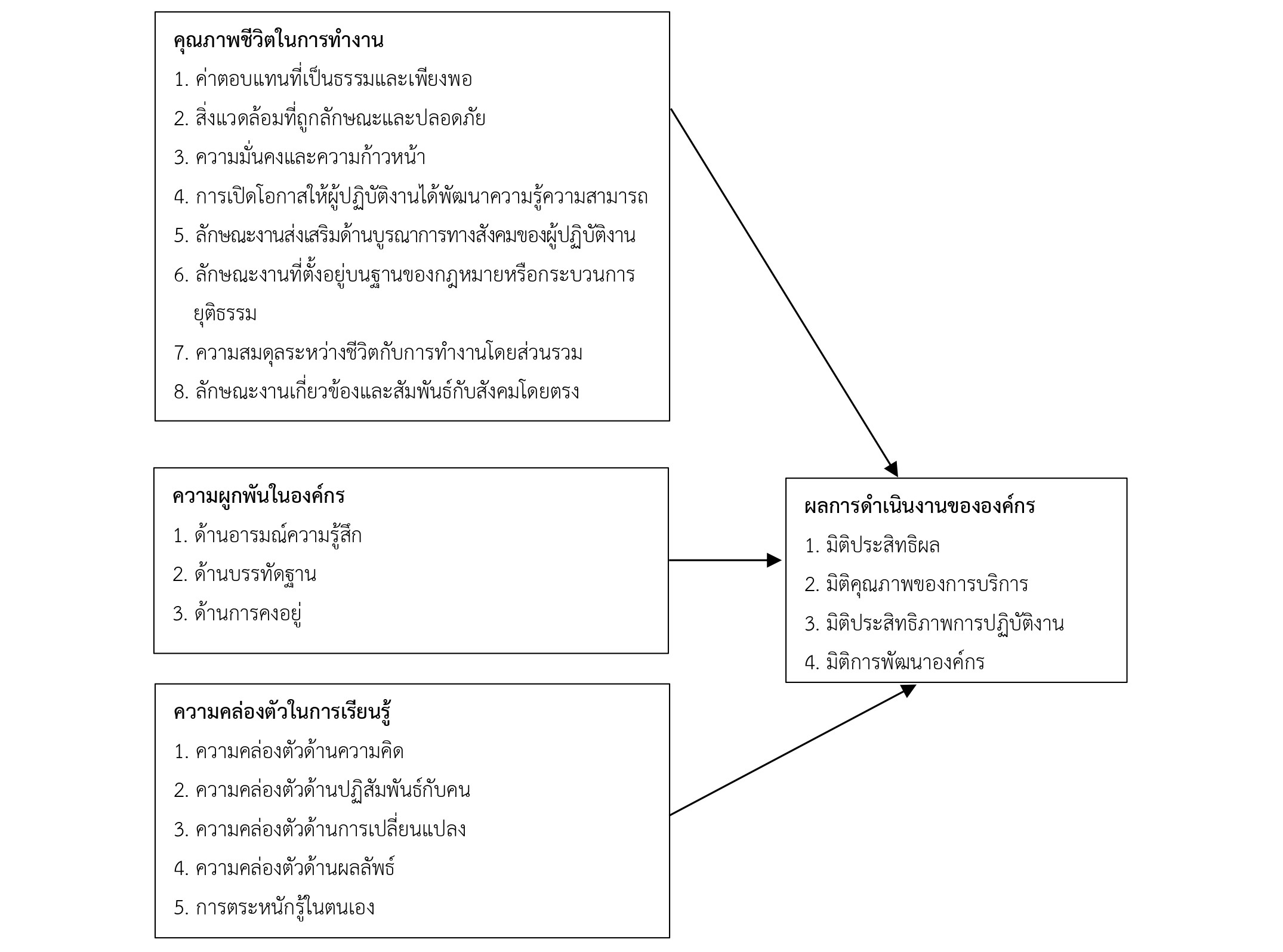The Quality of Working Life, Organizational Commitment and Learning Agility Affecting the Organizational Performance of State University in Phitsanulok Province
DOI:
https://doi.org/10.14456/psruhss.2024.20Keywords:
The quality of working life, Organizational commitment, Learning agility, Organizational performanceAbstract
This research investigated the quality of working life, organizational commitment, and learning agility that affected the organizational performance of the state universities in Phitsanulok Province. The objective of this study was to examine the influence of the quality of working life, organizational commitment, and learning agility on the organizational performance of the state universities in Phitsanulok Province. The 376 participants were universities’ academic personnel and academic support staff. Descriptive statistics and multiple regression analysis were employed for data analysis. The results revealed that the quality of working life, organizational commitment, and learning agility influenced the organizational performance of the state universities in Phitsanulok Province at a statistical significant level of 0.05.Additionally, it was found that organizational commitment influenced the organizational performance at a highest level, followed by quality of working life, and learning agility. Also, the forecasting equation was able to predict the organization's performance with an accuracy of 76.70 percent.
References
กัณฐิกา สุระโคตร. (2559). ความผูกพันธ์ต่อองค์กรของข้าราชการครูโรงเรียนขนาดกลาง ในอำเภอแก่งหางแมว สังกัดสำนักงานเขตพื้นที่การศึกษาประถมศึกษาจันทบุรี เขต 1 (วิทยานิพนธ์ศึกษาศาสตรมหาบัณฑิต). ชลบุรี: มหาวิทยาลัยบูรพา.
ถาวร อ่อนลออ. (2561). ความผูกพันต่อองค์กรและคุณภาพชีวิตในการทำงานของบุคลากร มหาวิทยาลัยเทคโนโลยีราชมงคลพระนคร. วารสารนวัตกรรมการศึกษาและการวิจัย, 2(2), 101-116.
ทิพย์จุฑา ผลเดชไพบูลย์. (2561). คุณภาพชีวิตในการทำงานกับความผูกพันต่อองค์กรของพนักงาน ในเขตวังทองหลาง กรุงเทพมหานคร (บทความวิชาการค้นคว้าอิสระ). กรุงเทพ: มหาวิทยาลัยรามคำแหง. สืบค้นจาก https://shorturl.asia/7DiV0
เทพศักดิ์ บุณยรัตพันธุ์. (2560). การจัดการเชิงกลยุทธ์โดยใช้เครื่องมือ Balanced Scorecard กับการประยุกต์ใช้ในการภาครัฐของไทย. วารสารการจัดการสมัยใหม่, 15(1), 11-22.
นิตยา ปาปะเถ. (2560). คุณลักษณะของงานที่มีผลต่อความผูกพันต่อองค์กรของบุคลากร คณะทันตแพทย์จุฬาลงกรณ์มหาวิทยาลัย (การค้นคว้าอิสระวิทยาศาสตรมหาบัณฑิต). กรุงเทพฯ: มหาวิทยาลัยศรีปทุม.
บงกช ตั้งจิระศิลป์. (2564). ความสัมพันธ์ระหว่างความผูกพันต่อองค์การ ความจงรักภักดีต่อองค์การและผลการปฏิบัติงานของนักบัญชีในจังหวัดระยอง. วารสารบริหารธุกิจอุตสาหกรรม, 3(2), 55-70.
บุญชม ศรีสะอาด. (2556). วิธีการทางสถิติสำหรับการวิจัย เล่ม 1 (พิมพ์ครั้งที่ 5). กรุงเทพฯ: สุวีริยาสาส์น.
ปิยะฉัตร เกตุแก้ว. (2564). คุณภาพชีวิตการทำงานและความผูกพันที่มีความสัมพันธ์กับผลการปฏิบัติงานของพนักงานในกลุ่มอุตสาหกรรมพลังงาน. วารสารมนุษย์ศาสตร์และสังคมศาสตร์ มหาวิทยาลัยราชภัฏสุรินทร์, 23(2), 33-46.
พิทยุตม์ โตขำ, ปิยะฉัตร จารุธีศานต์, และวิไลลักษณ์ เสรีตระกูล. (2564). ปัจจัยความสำเร็จของความคล่องตัวขององค์กร. วารสารรังสิตบัณฑิตศึกษาในกลุ่มบริหารธุรกิจและสังคมศาสตร์, 7(1), 101-118. https://doi.org/10.14456/jrgbsrangsit.2021.22
แพลตฟอร์มข้อมูลเมืองอัจฉริยะ. (2565). พิษณุโลกเมืองเศรษฐกิจ. สืบค้น 9 ธันวาคม 2565, จาก https://www.citydata.in.th/phitsanulok/reports/plk01/
มนัสนันท์ ใบคุณากร. (2563). อิทธิพลขององค์กรแห่งการเรียนรู้ต่อผลการดำเนินงานขององค์กรผ่านพฤติกรรมสร้างสรรค์นวัตกรรมของพนักงานธนาคารเพื่อการเกษตรและสหกรณ์การเกษตรฝ่ายกิจการสาขาภาคกลาง (วิทยานิพนธ์บริหารธุรกิจมหาบัณฑิต). กรุงเทพฯ: มหาวิทยาลัยศิลปากร.
มหาวิทยาลัยเทคโนโลยีราชมงคลล้านนา พิษณุโลก. (2565). รายงานการประเมินตนเอง ประจำปีการศึกษา 2564. พิษณุโลก: มหาวิทยาลัยเทคโนโลยีราชมงคลล้านนา พิษณุโลก.
มหาวิทยาลัยนเรศวร. (2565ก). แผนพัฒนาบุคลากร มหาวิทยาลัยนเรศวร (พ.ศ. 2564 – 2565). พิษณุโลก: มหาวิทยาลัยนเรศวร.
มหาวิทยาลัยนเรศวร. (2565ข). รายงานการประเมินตนเอง ประจำปีการศึกษา 2564. พิษณุโลก: มหาวิทยาลัยนเรศวร.
มหาวิทยาลัยนเรศวร. (2565ข). รายงานการประเมินตนเอง มหาวิทยาลัยนเรศวร ประจำปีการศึกษา 2564. พิษณุโลก: มหาวิทยาลัยนเรศวร.
มหาวิทยาลัยราชภัฏพิบูลสงคราม. (2565ก). แผนพัฒนาบุคลากรประจำปีงบประมาณ พ.ศ. 2563 – 2566. พิษณุโลก: มหาวิทยาลัยราชภัฏพิบูลสงคราม.
วิจิตรา จำลองราษฎร์. (2561). การวิจัยธุรกิจทางการเงินและการบัญชี. กรุงเทพฯ: สำนักพิมพ์ท้อป.
วิภา อ่ำกลัด. (2563). คุณภาพชีวิตและความผูกพันองค์กรที่มีความสัมพันธ์กับประสิทธิภาพ (สารนิพนธ์ปริญญาบริหารธุรกิจมหาบัณฑิต). กรุงเทพฯ: มหาวิทยาลัยศรีนครินทรวิโรฒ.
สถาบันส่งเสริมความปลอดภัย อาชีวอนามัย และสภาพแวดล้อมในการทำงาน. (2562). คุณภาพชีวิตในการทำงาน (Quality Of Working Life). สืบค้น 9 กรกฎาคม 2565, จาก https://www.tosh.or.th/index.php/blog/item/475-quality-of-working-life
สำนักงานคณะกรรมการข้าราชการครูและบุคลากรทางการศึกษา. (2561). คุณภาพชีวิตข้าราชการครูและบุคลากรทางการศึกษา ในเขตพัฒนาพิเศษเฉพาะกิจจังหวัดชายแดนภาคใต้ (รายงานการวิจัย). กรุงเทพฯ: สำนักงานคณะกรรมการข้าราชการครูและบุคลากรทางการศึกษา.
สำนักงานจังหวัดพิษณุโลก. (2559). บรรยายสรุปจังหวัดพิษณุโลก. สืบค้น 9 ธันวาคม 2565, จาก https://www.phitsanulok.go.th/describe55/briefing59.pdf
สิริพร มูลเมือง. (2564). คุณภาพชีวิตในการทำงานกับความผูกพันต่อองค์การของบุคลากร สำนักงานเขตสายไหม กรุงเทพมหานคร. วารสารนวัตกรรมการจัดการศึกษาและการวิจัย, 3(1), 29-40.
Bedford, C. L. (2011). The Role of Learning Agility in Workplace Performance and Career Advancement. Submitted to the faculty of the graduate school in partial fulfillment of the requirements for the degree of Doctor of philosophy Minnesota University.
Brightside People Team. (2020). Learning Agility. Search date 31 August 2022, Retrieved from https://www.brightsidepeople.com/agile-learning-agility/
Gochman, I., & Storfer, P. (2014). Talent for tomorrow: Four secrets for HR agility in an uncertain world. People and Strategy, 37(2), 24–28.
Haring, S. Shankar, J., & Hofkes, K. (2022). The Potential of Learning Agility: The relationship between Learning Agility and Success. Search date 31 August 2022, Available: https://www.hfmtalentindex.com/documents/91/The-Potential-of-Learning-Agility-Research-Paper-1.pdf
Kanning, U. P., & Hill, A. (2013). Validation of the Organizational Commitment Questionnaire (OCQ) in six Languages. Journal of Business and Media Psychology, 4(2), 11-20.
Likert, R., Samuel, P., & Hayes, Jr. (1957). Some applications of behavioural research. Paris: Unesco.
Suebsaeng, S., & Paungyanee, S. (2015). Organizational Commitment and Self-Efficacy Influence on Business Performance or Airline Business in Thailand. Journal of Humanities and Social Sciences Bansomdejchaopraya Rajabhat University, 9(2), 87–108.
Sung, E. (2021). Seven Facete of Learning Agility in Higher Education for Future Society. Educational Technology intonation, 22(2), 169-197.
Wahjusaputri, S., & Fadilah, H. (2022). The Impact of Learning Agility and the Work Environment during Work from Home (WFH) on Teacher Performance. Al-Ishlah: Journal Pendidikan, 14(4), 6695-6702.
Walton, R. E. (1973). Quality of Work Life: What Is It?. Sloan Management Review, 15, 11-21.
Williams, J. H. (2008). Effective Management: a Multimedia Approach. (3rd ed.). Masoxn, Ohio: Thomsom South-Western.
Yamane, T. (1973). Statistics an Introduction Analysis (2nd ed.). New York: Harper & Row.

Downloads
Published
How to Cite
Issue
Section
License
Copyright (c) 2024 Humanities and Social Sciences Journal of Pibulsongkram Rajabhat University

This work is licensed under a Creative Commons Attribution-NonCommercial-NoDerivatives 4.0 International License.
Any articles or comments appearing in the Journal of Humanities and Social Sciences, Rajabhat Phibulsongkram University, are the intellectual property of the authors, and do not necessarily reflect the views of the editorial board. Published articles are copyrighted by the Journal of Humanities and Social Sciences, Rajabhat Phibulsongkram University.








